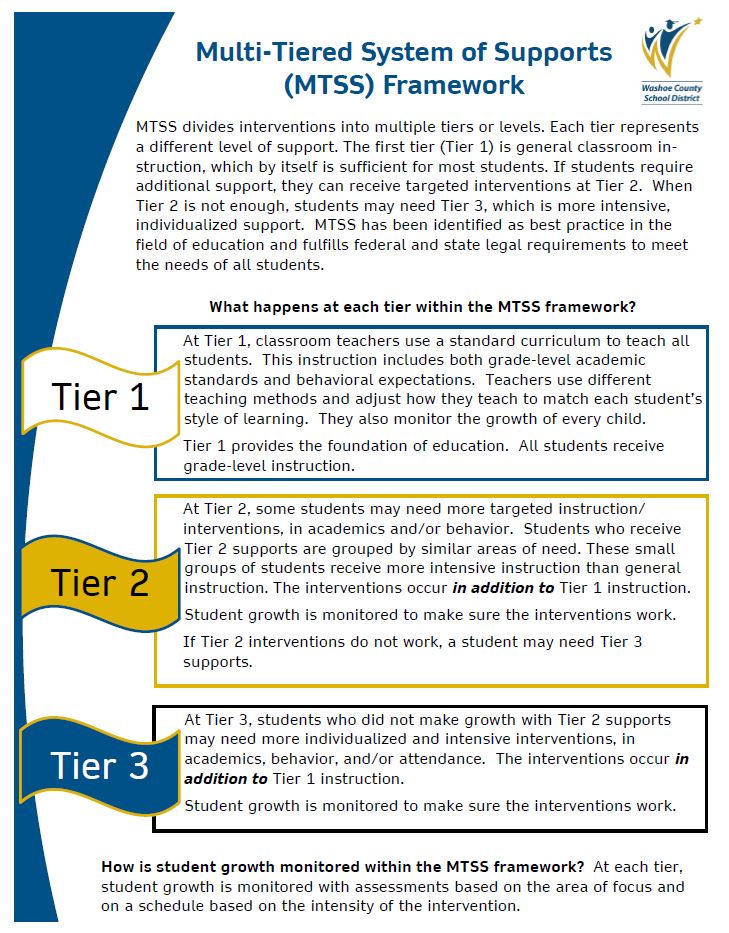- Washoe County School District
- Family Information
- Multi-Tiered System of Supports (MTSS) -- English
Multi-Tiered System of Supports
Page Navigation
Multi-Tiered System of Supports (MTSS)
-
Family involvement plays an important role in student achievement and has a positive impact on student achievement. Families are partners within the MTSS process. Families need information about the process when their child is first identified as possibly at-risk or is struggling in school. Communication and teamwork throughout the MTSS process improves results for all students. *En español
WCSD MTSS General Information Letter
What is the multi-tiered system of supports (MTSS)?
The multi-tiered system of supports (MTSS) is a framework that supports success for all students that:
- provides early academic and behavioral help, rather than waiting for a student to fail;
- provides an improved way for school teams to meet the individual needs of your child;
- provides instruction at different levels or tiers depending on the needs of each student; and
- is available to all students to help them succeed and to increase student achievement.
What are the goals of a multi-tiered system of supports (MTSS)?
The goals of the multi-tiered system of supports are to:
- improve the quality of instruction;
- prevent unnecessary academic and behavioral failure;
- provide proven, or evidence-based, interventions for all students;
- prevent unnecessary referral to special education;
- prevent, rather than react to, student difficulties;
- involve and support parents as partners in the MTSS process; and
- to support teachers use of effective instructional strategies and practices.
What is the multi-tiered system of supports (MTSS) process (more detailed information)?
While the MTSS process may vary from school to school, the following is a basic framework for how most schools implement MTSS.
Tier 1: All students receive Tier 1 instruction focused on grade-level standards and school-wide behavioral expectations. All students are screened both academically and behaviorally to determine how all students are progressing. The school reviews the instruction provided to all students, and ensures that each student’s progress is monitored. Teachers differentiate instruction, or use different approaches, to meet unique student needs.
Tier 2: For students who do not make adequate progress with Tier 1 instruction, the school team:
- gathers more specific information about the individual needs of the student;
- develops an intervention plan for each student, including how the information will be collected and reviewed with the parents throughout the process; and,
- provides evidence-based intervention matched to the need of the student in a small group setting.
Tier 2 interventions are provided in addition to Tier 1 instruction. If a student does not make adequate progress with the first small group, targeted intervention, the student may remain in Tier 2 but receive a different type of intervention during a second or third phase within Tier 2.
Tier 3: For students who have not achieved the goals established in small group, targeted intervention plans at the Tier 2 level, the school team provides increasingly individualized interventions and/or provides interventions on a more frequent basis at the Tier 3 level. Tier 3 interventions are provided in addition to Tier 1 instruction.
What can you do if you have concerns about your child’s progress?
- Communicate regularly with your child’s teacher.
- Contact your child’s teacher, counselor, or other staff member and ask for a team meeting to:
- review your child’s MTSS data;
- discuss your child’s strengths, work samples, peer relationships, and challenges; and
- collaborate on strategies you can use to support your child at home.
If at any time in the process the parents or the school staff suspect that the student has disability, the student should be referred for a special education evaluation. Any information collected from the intervention process will and should be reviewed as part of the evaluation. The student may continue to receive support and interventions while the special education evaluation is in progress.


